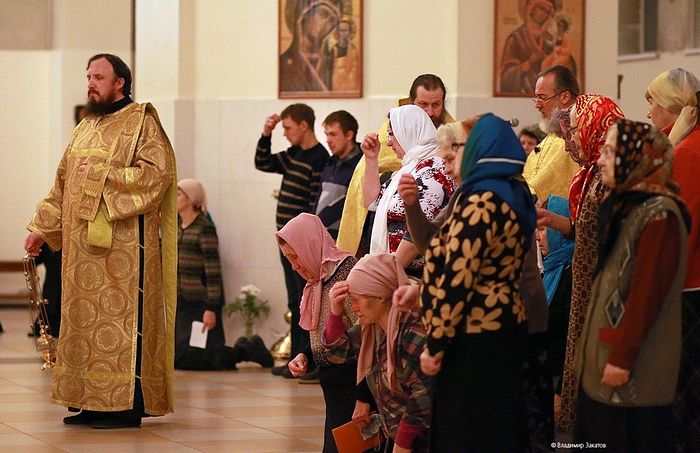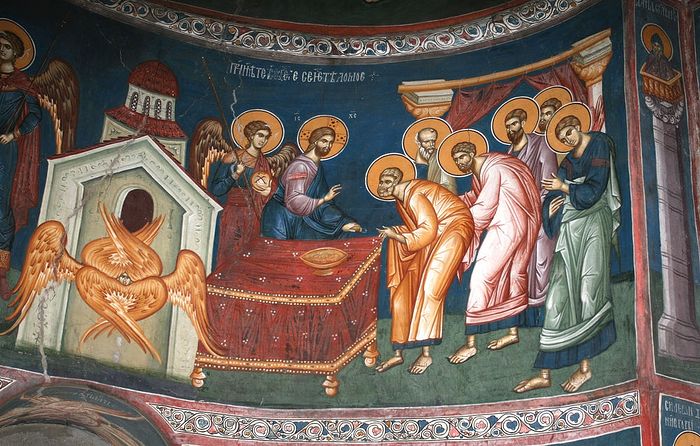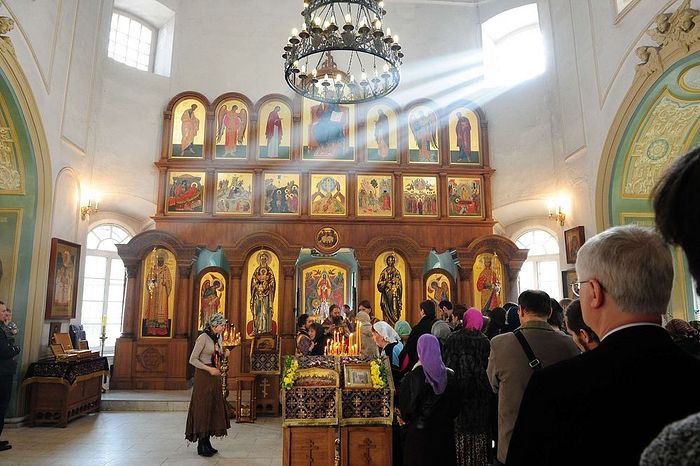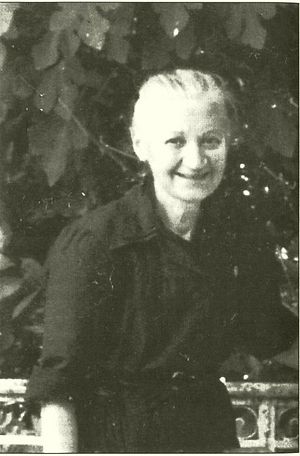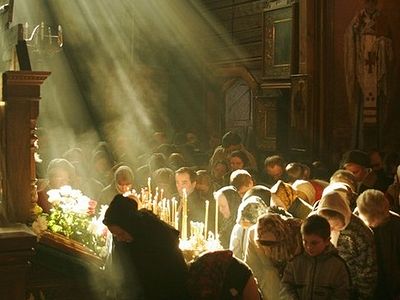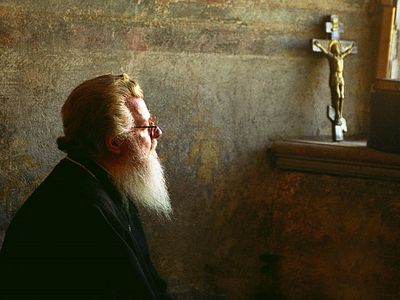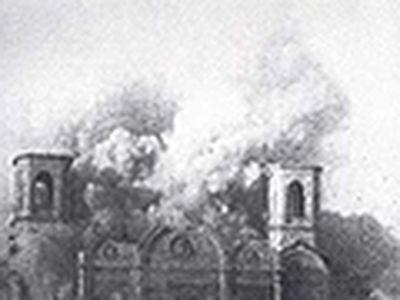Today one can often hear the phrase: “Why go to church if I have God in my heart?” It would seem that one could only envy this person. True, if God is in your heart, then church-going is seen as something quite unnecessary. But a question arises here: Is this confidence well grounded? What if this person has God not in his heart, but in some other organ, for example, in his stomach? And what if the stomach itself has become a “god” for him? As Apostle Paul said: …whose God is their belly (Phil. 3:19).
But supposing this person is right and his heart has really become the abode of God, can we be sure that this is the true God and not someone else who disguises himself as God? This is what St. Theophan the Recluse wrote about it: “The demons can sense a faster and a man of prayer from a distance. And they run far away from him in order to avoid a painful blow. Is it then reasonable to think that where there is no fasting and prayer, there are the demons? Yes, it is. The demons dwelling in a person do not always reveal their presence, but hide, teaching their host every evil on the sly”.1 In other words, someone may be confident that he is the temple of the Living God, whereas he is just a plaything in the hands of the wretched spirits.
Somebody may say: “Yes, I do keep the fast and pray, but I don’t go to church.” It can be answered that fasting and prayer are, no doubt, good and necessary, but they are not enough.
When a Christian, even if he practices private prayer, voluntarily stops attending Church services, it is a symptom of a spiritual illness, according to the Church Holy Fathers. Here is a story on this theme related by the holy elder Barsonuphius of Optina. Once one spiritual father was asked whether there are clear signs indicating that a soul is drawing close to God or drifting away from Him? There are certain indications that one or another thing from our everyday life is good or bad. For example, you can always notice when your food—meat, cabbage, fish—is spoiled, because rotting food smells and looks bad, changes its color and taste. But what about the soul? It is bodiless and cannot change its smell or look bad.” And the holy elder replied that avoiding Church services is an unmistakable sign of a state that is close to a soul’s death. If someone’s love for God has grown cold, he first of all loses interest in Church services. First he tries to come to services later, and then he stops attending the holy church of God completely.2
Thus, our thirst for Church services is the litmus test by which we can check the state of our souls. Our love for church worship indicates that the Lord abides in our hearts.
It can be compared with human relationships. If we love someone we try to be close to him or her. For example, if we say to our friend: “You are always with me, I have you in my heart, so I do not have to come to greet you on your birthday,” we can hardly expect any words of understanding and approval in reply. It is the same in our relationship with God. If God really dwells in our hearts, if we love Him or at least try to love Him, then why shouldn’t we honor the Nativity or the Resurrection of Christ, the Son of God, Who became the Son of Man, Who went through humiliation, suffering and death for our salvation? How can we ignore the festivals in honor of the Most Holy Theotokos through Whom God became Incarnate? Or how can we shun the commemoration of the Heavenly Bodiless Powers or the saints who stand before the Throne of God, unceasingly interceding for us—lazy, sinful and constantly justifying ourselves as we are?
The greatest Christian sacrament of Communion of the Body and Blood of Christ is the culmination of Church worship. The entire structure of the Divine Liturgy gives us the best way to prepare ourselves for this sacrament, and it is the threshold to and a foretaste of our eternal life with God. It is in Church services that the Orthodox teaching of the Church as the Body of Christ reveals itself in a visible way. The Church is Christians united with Christ into one divine-human organism. Like a body, which naturally keeps its wholeness, so it is natural for a Christian to strive for unity with the Head of the Church—Christ, and with all Christians, united in Christ in one Body. That is why participation in Church services for a Christian is neither a painful duty, nor a severe punishment, nor a refined torture; on the contrary, it must be a natural and vital aspiration. Lack of it should be taken as a signal that we are spiritually ill, that we are in serious danger and must immediately mend our ways.
True, sometimes it is not easy for us to participate in public services, sometimes we are not keen to go. At times we are in no mood to do this and have to force ourselves to go to church. But otherwise our spiritual life is impossible.
Where does this reluctance or unwillingness come from? It stems from our passions that have taken root in our souls and have even become our “second nature” (as the saying goes, “habit is second nature”), and we will not be able to “uproot” it without labor and illness.
The influence of Church services on passions can be compared to the impact of light on inhabitants of a dark cave. Then animals and insects, accustomed to night and darkness, begin to move and try to fly away, to make off, to creep away to the dark, isolated, “safe” places that they are used to, further away from the light.
Likewise, our passions are “sleeping” in the comfortable darkness of our souls, as long as we are away from the Church, from worship and services. But we have only to come to church for a service, and at once all these hellish powers rise in our bodies and souls. Instantly you feel that feet are giving way under you, your mind is in haze, your back aches… And everything around annoys you: readers read inarticulately, choristers sing out of tune and make mistakes, the priest is either absent or in a hurry, the deacon looks defiant, the church shop workers are not polite, all have gloomy faces, and if they begin to joke or smile it is annoying, too (“After all, this is a sacred place!” you think to yourself). And the thought comes to your mind: “What am I doing here?” And if you are unaware of the need of praying in church, your chances of remaining in the Church are slim. Yet the Church is the only place in the world where we can find genuine comfort.
The state of despondency (or depression, as they say now) is familiar to many, when nothing brings you joy and you cannot find meaning in anything. And you don’t want to go to church in this state either. But Orthodox people know, that if you do make an effort and reach church at the time of a service, everything changes in some miraculous way. You have stood through the service in a somewhat confused way, haven’t listened to prayers attentively, have prayed not so much as tried to overcome the storm in your mind and the thoughts that crowded in on you; but as you leave the church you feel peace of mind. Outwardly, nothing seems to have changed—the circumstances remain the same, but these difficulties don’t seem insurmountable any more.
And that is not surprising. In the house of God our imperfect prayer is made full, uniting with all the prayers of the Holy Church of Christ, in which the Spirit itself maketh intercession for us with groanings which cannot be uttered (Romans 8:26). That is why in most cases our private prayer, very deep and concentrated as it is, will not be as good for our souls as a Church prayer, even if it is imperfect.
The Holy Fathers often call the Church “heaven on earth”. Here we come in contact with the celestial word, enter the realm of eternity, so to speak. Here our passions are suppressed and we are protected from the forcible impact of the evil spirits, which (even if only for a time) cannot affect us. Every time we enter the space of a church it means we (at least for a short time) voluntarily leave this world that lieth in wickedness (1 Jn. 5:19) and avoid its deadly sting.
The effect of public prayer is the reverse side of the double and greatest commandment of love for God and for our neighbor, since the private prayer of each Christian in church is reinforced by prayers of other worshippers on the one hand and divine energies on the other.
This is what the Holy Hierarch Simon, Bishop of Vladimir and Suzdal (+ 1226, feast: May 10), wrote on this subject: “Don’t be deceitful and don’t withdraw from the church congregation: just as rain makes the seed grow so the Church calls the soul to do good works. Whatever you do in your cell, whether it be psalmody or recitation of the Twelve Psalms, it is of little importance and cannot be compared with just one joint exclamation ‘Lord have mercy!’ My brother, you should understand that the apostle Peter himself was the foundation of the Church of the Living God, and when Herod seized him and put him in prison, wasn’t it through the prayers of the Church that he was delivered from Herod’s hands? And the Holy King David sings: One thing have I desired of the Lord, that will I seek after; that I may dwell in the house of the Lord all the days of my life, to behold the beauty of the Lord, and to enquire in his temple (Ps. 27:4). And Jesus Christ Himself said: My house shall be called the house of prayer (Mt. 21:13); and also: For where two or three are gathered together in My Name, there am I in the midst of them (Matt. 18:20). If an assembly of over 100 brethren is gathered, then why not believe that our Lord is amongst them?” 3
True, there may be objective circumstances that prevent us from going to church. But not all that seems to be an obstacle to us is such in the eyes of God. In this respect the following fragment of the Life of the Holy Righteous Juliana of Murom (+1604, feast: January 2) is significant: “Once there was a winter so severe that the ground was cracking with frost. So, Juliana did not go to church for some time and prayed to God at home. One day a local priest came to the church early in the morning and heard a voice from an icon of the Most Holy Mother of God, saying: ‘Go and ask merciful Juliana why she has stopped attending church? Although her home prayer is pleasing to God, Church prayer is still more pleasing to Him.’”4
For a person who is determined to follow the divine path his presence at Church services becomes even a greater need than physical food. But this need is felt most keenly by saints. Thus, St. John of Kronstadt acknowledged: “I am extinguished, die spiritually when I don’t serve at church for a whole week; and I am rekindled, enlivened in soul and heart when I serve...”5
Nevertheless, even today in every Orthodox parish church one is likely to meet at least one old parishioner who, like Anna the Prophetess from the Gospel (Lk. 2:36-38), almost never leaves the church, albeit the environment is not favorable at all. Her relatives as well as Orthodox brothers and sisters reproach her, try to convince her to restrain her fervent ardor, but the old woman, despite her age and illnesses, still tries to attend her beloved Liturgy nearly crawling “on all fours”.
And in conclusion let me give you an amazing example of invincible love for the Divine Liturgy that a contemporary Greek woman-ascetic had. “God-loving Keti [Eriketti Patera: 1921-2003; a friend of St. Paisios the Athonite] did not want to miss any Vespers or Liturgy. She wished to go to a service every day, so she tried to find churches where the Liturgy was celebrated on weekdays as well. She slept very little and walked great distances, which would take her many hours, in order not to miss the Divine Liturgy…
“Keti strove to get acquainted with priests of all neighboring settlements so that she had an opportunity to invite them to celebrate the Liturgy. She mostly attended the Church of Pantanassa. At night she would cross the River Louros on a suspension (rope) footbridge. In winter it was often covered by ice, while Keti always carried several bags with food for the poor.
“Once, when the footbridge was washed away, an old herdsman helped her cross the river. At times her journey took many hours. One day dogs attacked the ascetic, another time she encountered a bear, but the animals did her no harm.
“It is hard to describe all that happened to Keti. Then there were no telephones. One day none of the priests warned her that there would be no Liturgy. After work, Keti set off as usual. First she reached Philippiada, then proceeded to Ano Kambi, Pantanassa and Agios Georgios. But services were being held nowhere, and it became dark. Next Keti walked to Kerasovo and from there—to Voulista, where she was joined by a priest’s sister. On their way the women stumbled and fell into a pit. In fact they sank up to their knees in asbestos. Then they rose, tidied themselves up and continued their way to the church for the Liturgy. Over the evening and night Keti walked a total of thirty kilometers (c. 18.64 miles). And this was something that happened regularly.
“Once when she was at church, Keti fell off a chair on which she had got up so as to light up the candle-lamps. She had a hip fracture and was taken to a hospital where a complete bed rest was prescribed for her. It meant she was not supposed to go to church. Although lame, Keti left the hospital, stopped a car and came to St. George’s Church in Philippiada where the priest was Fr. Vassilis Zalakostas, whom she knew. She reached that church and lay down at its porch. The ascetic spent twenty days and nights at that church where the priest came and performed the Divine Liturgy daily.
“Once in winter the weather was so nasty that hurricane winds were uprooting trees. But even this did not stop Keti. Without any hesitation she went for the Liturgy but did not return for a long time. The woman’s co-workers were waiting for her in anxiety. At last she appeared. Keti’s face was radiant with joy, while her feet (as far as they could be seen from under her long dress) were bleeding. She related that her delay was due to the consequences of the storm: On her way she had to climb over the trees that had been blown down by the wind.
“So what did Keti feel during the Divine Liturgy? We believe it was something unexplainable, given the fact that she did her best, tried to overcome all difficulties in order to pray at the Liturgy. She sang in the church, gave presents to priests, carried heavy liturgical books with her.
“From time to time she could go for a midnight service and early in the morning went to pray at another service. After that, while visiting her friends, she heard a radio broadcasting of a Church service and therefore stood up to pray for the third time in a single day. She knelt down and made low bows. And no noise could distract her…
“So great was her love for Church services that even in her sleep she used to whisper: ‘Church, Church’.”6
It only remains for me to wish all of us to have at least a little bit of the love for Church worship that is described in these lines!
